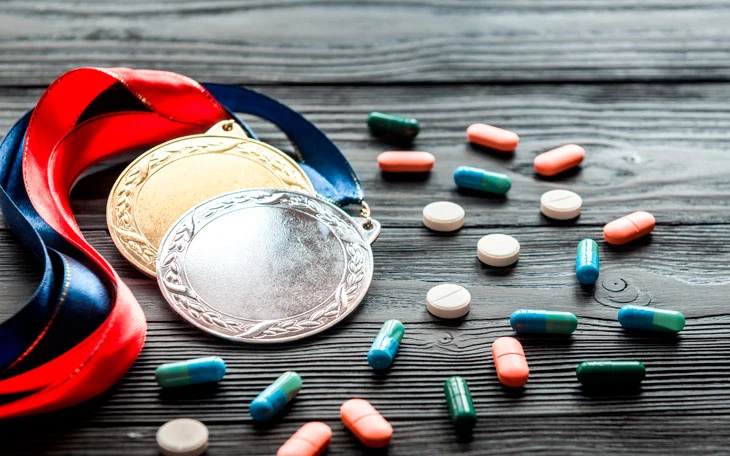Not only does it instantly improve performance, but the types of doping that are prohibited for athletes can also cause harmful side effects to the body.
Doping is a term used to refer to prohibited substances that athletes are not allowed to use. This is because the use of doping drugs violates the ethics of sportsmanship in sport.
This is because doping can instantly improve an athlete’s performance. Doping also increases energy, muscle mass, endurance, reduces recovery time, and eliminates traces of other drugs consumed by athletes.
For this reason, the World Anti-Doping Agency has released a list of doping substances that are prohibited for use by athletes. This is because, in addition to being proven to enhance physical performance, doping can also trigger dangerous side effects that can threaten life safety. Here are five dangers of doping drugs that you should be aware of.
1. Erythropoietin (EPO)
According to Drugs.com, erythropoietin, also known as epoetin alfa (EPO), is a type of synthetic protein. This synthetic protein helps the body produce erythrocytes, or red blood cells.
In the medical world, EPO is commonly used to treat conditions such as red blood cell deficiency or anemia.
This drug is specifically given to patients experiencing anemia due to chemotherapy, chronic kidney disease, and side effects of HIV (human immunodeficiency virus) infection therapy.
Citing Scielo, epoetin alfa is abused by athletes as a doping agent, especially in endurance sports.
This doping agent not only functions to increase erythrocyte concentration but also optimizes oxygen distribution to muscle tissue. This increases muscle strength and speeds up recovery time.
However, Dr. Sara Elise Wijono, M.Res., explained that this type of doping used by athletes can cause side effects such as heart attacks and strokes.
This is because EPO can increase blood viscosity and blood pressure. Both are risk factors for cardiovascular diseases such as heart attacks and strokes.
Furthermore, EPO abuse can also cause other dangerous side effects, such as accelerated tumor growth and even death.
2. Anabolic Steroids
Anabolic steroids are commonly used to treat delayed puberty in adolescent boys. These drugs are also used to treat hypogonadism.
Hypogonadism occurs when the sex glands do not produce sufficient hormones; one example of hypogonadism is impotence.
Athletes may abuse anabolic steroids to enhance their physical performance. This is because these doping drugs can stimulate tissue growth, especially bone and muscle.
However, anabolic steroid abuse is extremely dangerous. These drugs can cause a number of side effects, such as kidney damage, liver damage, tumors, heart problems, and reproductive system disorders.
3. Stimulants
Stimulants are a type of drug that affects the central nervous system. These drugs can stimulate the brain, increase energy, and increase self-confidence and alertness.
Athletes use stimulants as doping to reduce fatigue. Stimulant drugs can also increase adrenaline, concentration, competitiveness, and aggressiveness during competition.
Commonly, the types of stimulants used by athletes include amphetamines and methylphenidate.
The side effects of these drugs depend on the type and method of use.
Stimuli can generally cause side effects such as addiction, paranoia, severe psychosis, depression, and even increased suicidal tendencies.
Overdose of stimulants can be fatal.
4. Growth Hormone
Growth hormone, or human growth hormone (HGH), is prescribed by doctors to treat growth hormone deficiency, Prader-Willi syndrome, Turner syndrome, idiopathic short stature, and growth failure in low birth weight children.
In the body, growth hormone stimulates the liver to release a protein called IGF-1.
The IGF-1 protein, in turn, stimulates the growth of bones, muscles, and other tissues. This drug function is then abused by athletes to enhance their physical appearance.
However, this type of doping can trigger side effects such as increased blood pressure in the brain, impaired vision in diabetics, and worsening conditions such as scoliosis, hypothyroidism, and pancreatitis.
Side effects of growth hormone abuse can also cause swelling in the arms and legs.
5. Diuretics
Diuretics are not a type of doping that can enhance performance. Athletes use these drugs to increase urine production and eliminate steroid traces in the body.
Furthermore, this type of doping used by athletes can cause temporary weight loss.
In general, diuretics can cause side effects such as dizziness, constipation, dry mouth, spikes in blood sugar levels, muscle cramps, and fatigue.
These are the types of doping prohibited for athletes. The side effects of doping are far worse than the temporary effects of enhancing performance.
Therefore, always uphold sportsmanship, never use doping, and prioritize long-term health.

